Democratic
Candidates Make the Case
Seven Presidential Hopefuls Address
Members of the DNC at the Party's Winter Meeting
[Posted February 23, 2003]
Seven of the nine announced Democratic candidates for president spoke to
members of the Democratic National Committee at the party's annual winter
meeting, held in Washington, DC from February 20-22, 2003. DNC chairman
Terry McAuliffe noted that the meeting was the most well attended in the
history of the Democratic party. "And I'm just counting the candidates,"
he stated.
At least three hundred and
seventy of the 441 members of the DNC turned out. This is a particularly
important audience for the candidates to reach; the 441 DNC members are
all unpledged delegates to the party's national convention in Boston, accounting
for 10 percent of the delegates.
The DNC members, state Democratic
party staffers, and other Democratic activists heard the presidential hopefuls
lambast President Bush, particularly on his handling of the economy and
homeland security, and present their ideas for America's future.
The prospect of a war with Iraq emerged as the sharpest point of distinction
among the candidates. All signs indicate that America will likely
initiate war with Iraq within a month; Sen. Joseph Lieberman (CT), Rep.
Richard Gephardt (MO) and Sen. John Edwards (NC) supported action to disarm
Saddam Hussein, while former Amb. Moseley-Braun, former Gov. Howard
Dean, Rev. Al Sharpton, and Rep. Dennis Kucinich opposed such action.
| The candidates'
speeches, nominally ten minutes each, were spread over two days so as not
to overwhelm members. In addition, for two hours on Friday "Meet
the Candidates" open houses were held in individual suites, affording DNC
members the opportunity to make the rounds and talk with the candidates
informally. Some of the candidates also dropped in at various caucus
sessions and at gatherings of the College Democrats and Young Democrats.
Throughout the meeting, the main hotel lobby was a scene of much networking
and cross pollination as campaign staffers mingled with the DNC members
and party officials.
In addition to the candidates'
presentation of their ideas some of the campaigns also deployed goodies.
Most impressive in this regard was the Dean campaign which prepared 400
small cellphane bags for attendees containing Vermont maple syrup, chocolate
and coffee. The Dean campaign also distributed plastic prescription
medicine bottles for people to put in contributions of small change.
In the Dean suite Ben & Jerry's ice cream was served. Members
stopping in at Lieberman's suite could get ceramic cup- of-Joe coffee mugs,
made in America by union labor. The Edwards suite had a fair supply
of tee-shirts.
Of the announced candidates,
Sen. John Kerry (MA), who is recovering from successful surgery for prostate
cancer did not attend, nor did Sen. Bob Graham (FL) who has set up an account
to raise money for a possible presidential campaign, but is recovering
from heart surgery. Former Sen. Gary Hart and Gen. Wesley Clark,
mentioned as possible candidates, had no noticeable presence. Two Al Gore
loyalists took it upon themselves to distribute draft Gore flyers in the
main lobby. |
|
Technology Upgrade: Project 5104
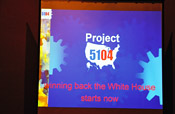 Democrats
are laying the groundwork for their 2004 presidential nominee, whomever
he or she may be, to wage a successful campaign against President Bush.
In a briefing on Thursday, McAuliffe acknowledged that 2002 was a "wake-up
call for Democrats." "Something happened that our polling data did
not pick up," he stated. Citing the example of Atlanta, McAuliffe
said the Republicans had succeeded in boosting turnout in exurban and rural
areas. Democrats needed better targeting he said.
Democrats
are laying the groundwork for their 2004 presidential nominee, whomever
he or she may be, to wage a successful campaign against President Bush.
In a briefing on Thursday, McAuliffe acknowledged that 2002 was a "wake-up
call for Democrats." "Something happened that our polling data did
not pick up," he stated. Citing the example of Atlanta, McAuliffe
said the Republicans had succeeded in boosting turnout in exurban and rural
areas. Democrats needed better targeting he said.
Under McAuliffe's tenure
the Democratic party has undertaken a major technology upgrade. "Project
5104," shorthand for achieving 51 percent of the vote in 2004, brings together
sophisticated software and database applications that will help the party
address three major challenges identified by McAuliffe. At the center
of Project 5104 is the voter file. DNC DataMart has information on
158 million voters. The DNC spent 18 months building the file, which
was finished a week before the 2002 elections.
The first challenge is campaign
finance reform. The Bipartisan Campaign Reform Act of 2002, which
went into effect following the November 2002 mid-term elections, prohibits
large "soft money" contributions to the parties. McAuliffe has focused
on building up the party's small donor database. He boasts of a 70
percent growth in the donor list, which is approaching 1 million names,
and of reducing donor age and markedly improving the net. A "Demzilla"
database allows the party to track and manage all donor contacts.
Demzilla is also connected to the party's website.
McAuliffe termed the second
challenge "restoring message contrast." He went through a litany
of problems that have grown and worsened under the Bush administration,
from loss of jobs to soaring budget deficits. Technology will help
Democrats to better localize their message he said.
Third, McAuliffe said Democrats
need to regain their mobilization advantage. In fall 2002 Democrats
did experiments in several states using the voter file and were able to
identify tens of thousands of additional voters who could then be contacted
with get out the vote messages.
The Alterian(R)
Studio
and Market Zone software is, quite simply, astoundingly powerful and easy
to use. A demonstration showed how easy it is to identify low income
voters in Missouri, which does not have party registration. The user
can drag and drop icons representing the list of primary voters, the list
of general election voters and a list of low income residents. It
functions just like the Venn diagram from school math days, and in a minute
or less out comes the desired subset of names and contact information.
The possibilities are almost limitless: single women, moderate income Hispanics,
and so forth.
Ultimately, said Doug Kelly,
the DNC's director of technology, technology may change the Democratic
party itself by getting more people involved and putting "little 'd' democracy
back into the party."
McAuliffe: "George Bush is Beatable"
Helping to put all this
technology to use will be political strategist Teresa Vilmain, whom McAuliffe
announced will be the DNC's general election strategist. Although
the field of presidential candidates is crowded now, McAuliffe asked the
candidates to "pledge to come together and support our nominee once the
primary process wraps up in the spring of 2004." After all the candidates
had spoken, McAuliffe emphasized three points: George Bush is beatable,
Democrats have a great roster of candidates, and the DNC has the right
tools. With that many of the attendees began their journeys home.
Copyright © 2003 Eric
M. Appleman/Democracy in Action.
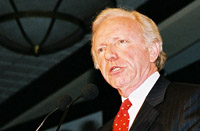
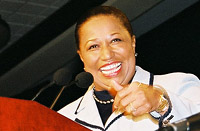
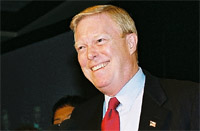
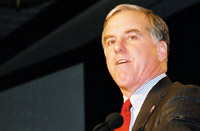
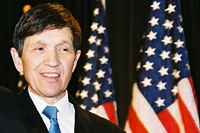
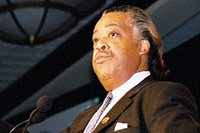
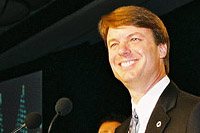
 Democrats
are laying the groundwork for their 2004 presidential nominee, whomever
he or she may be, to wage a successful campaign against President Bush.
In a briefing on Thursday, McAuliffe acknowledged that 2002 was a "wake-up
call for Democrats." "Something happened that our polling data did
not pick up," he stated. Citing the example of Atlanta, McAuliffe
said the Republicans had succeeded in boosting turnout in exurban and rural
areas. Democrats needed better targeting he said.
Democrats
are laying the groundwork for their 2004 presidential nominee, whomever
he or she may be, to wage a successful campaign against President Bush.
In a briefing on Thursday, McAuliffe acknowledged that 2002 was a "wake-up
call for Democrats." "Something happened that our polling data did
not pick up," he stated. Citing the example of Atlanta, McAuliffe
said the Republicans had succeeded in boosting turnout in exurban and rural
areas. Democrats needed better targeting he said.